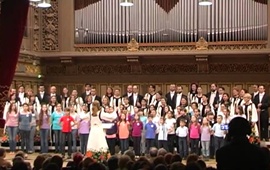> [Archived] Interviews

Ion Marin talks about the CANTUS MUNDI Project
Ion Marin said the following about this project:
The Cantus Mundi Project is at its beginning, but at the same time, it is so extraordinary that I avoid talking about it in statistic terms. We aready have 1500 children from all around the country - from the 1st form to the 4th form, from musical high schools, normal high schools, from organizations for children with physical disabilities, such as the Down Syndrome, blind or with hearing and speaking deficiencies, from orphanages or with different cultural backgrounds and so on. This programme is completely free from racism and its core is the amazing force the music has, being used as a means of communication and for social integration. This project is one of the best things that happens in Europe nowadays and I hope with all my heart that all those who are listening to us, all school people and music teachers, will check the website page: www.cantusmundi.com and register as many as possible, so that there will be an efficient increase in the number of members that bind us in common purposes: the love we have for Romanian children and the goal to make them known in the musical industry, even those from special schools and organizations from all around the country.
The necessary steps are the following: to learn more about the project and to sign up, so that this experience will exceed your expectations and your needs as much as possible, providing mutual assistance. This mutual assintance is more than a simple attempt to help; a lot of people think that money is the answer to everything. It`s true, money indeed solves many problems, but besides this, you have to deal with other situations as a group. As an example, I have been in Iași last month where aproximately a thousand children applied to the Cantus Mundi Project. This time I went to Sf. Gheorghe together with Christine Rhomberg, from the Hilti Foundation - one of the biggest socio-cultural foundations of Europe - where I have seen great improvement because of the Cantus Mundi Project.
Fistly, I visited a remarkable teaching class of social education for children with Down Syndrome, which was done mainly through music and this time we managed to provide musical instruments specially made for these children. I have seen an incredibly talented choir, Campanella, from the Art High School in Sf. Gheorghe; I have seen a village that has 1200 inhabitants who were part of community choirs for children, for adults and for retired people and they also have an orchestra for children and for adults...It`s amazing how devoted these people can be. Then, we saw another choir from an elementary school, made up of children from the 1st form to the 4th form and the choir from another high school in Sf. Gheorghe...
I was extremely glad to see that our project was understood in Covasna, because what we believe in is social integration; this is what defines Cantus Mundi. This project takes the needs of each child seriously and doesn`t regard children as numbers that fill up a classroom. This isn`t a charade, it is something we do with all our hearts and music helps us provide this kind of joy for children and even those who live in a village will have the chance to be known. As a proof, we are talking about them right now on the most important Romanian radio station. These children should have a special place in our thoughts all the time and in the thoughts of our leaders.
Translated by Ana-Maria Florea and Elena Daniela Radu
MTTLC, The University of Bucharest














